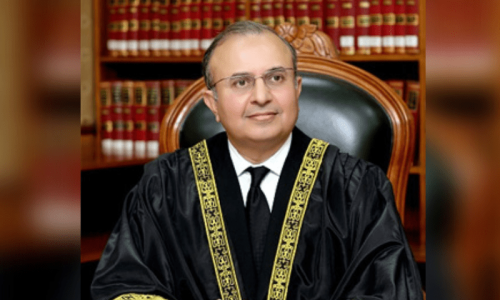AS I sat in Prime Minister House, anticipating the arrival of Prime Minister Imran Khan, I had a feeling of hope and triumph that my decade of struggle had finally borne fruit. It was not only me but before my meeting with the prime minister, I had received many calls from the families of missing persons, and they were hoping that this unprecedented meeting would be a step towards the release of missing persons in illegal detention or that at least they would find out where they were. But I think we still have a torturous wait ahead of us.
After spending a week under the open skies in Islamabad’s nail-biting cold and sleeping in D-Chowk, we were given good reason to end our protest — Prime Minister Khan was going to meet us in mid-March. As the first step, the families of the missing persons were asked to send the names of the latter as the prime minister would give them an update during the meet-up.
Before he became prime minister, Imran Khan was one of the most vocal voices against enforced disappearances. On March 18, three representatives of Baloch missing persons’ families including myself, accompanied by Minister of Human Rights Shireen Mazari and Zobeida Jalal met Prime Minister Khan. We stepped into his office with infinite hopes and expectations.
The first thing that saddened me was that he had no information about our loved ones. Worse, he was given wrong information, the kind that most families are conveyed: they have gone away of their volition or have gone to the mountains or have been picked up because of personal enmity. Soon the prime minister was given some written information about our missing family members. The first bit was about my father.
‘We need more than assurances. We are tired. We need results.’
The prime minister asked me if my father had been picked up because of personal enmity. I said that wasn’t true and told him that there were witnesses who could testify that my father was abducted by the security forces. At this, the prime minister asked his personal secretary to get a follow-up on the cases and asked for new and updated reports. We were told we would be updated soon but were not given a date despite our insisting on it.
We are told by activists and politicians that the prime minister is powerless regarding this issue, but we hope against hope. He had vowed no one would go missing when he became prime minister. We did not doubt his sincerity as we shared the stories of our pain, PTSD and sufferings. He felt all our pain and suffering.
The prime minister promised us that he would meet the army and ISI chiefs to discuss the matter and pass a bill to criminalise enforced disappearances. The statement of DG ISPR, that the issue of missing persons will be resolved soon and the prime minister’s assurance that he would do his best to ascertain the whereabouts of and release our missing loved ones, are welcome, but we need more than assurances now. We are tired. We need results.
Our lives have become a quest. Before the abduction of our family members, we had not seen cities like Karachi and Islamabad. Now we spend our time on their streets and outside their press clubs carrying portraits of our missing persons. We feel constant pain.
I first came to Islamabad in 2010 and again with swollen feet. I walked 3,000km from Quetta to Karachi and then to Islamabad for the release of my father. This January too was the first time that most of our suffering families came to Islamabad.
Our demands are very simple. We want to escape the collective punishment that an entire family suffers after the disappearance of one person. We want the release of missing persons. If they are suspected of committing a crime, they should be presented in a court of law.
From the judiciary to the Commission of Inquiry on Enforced Disappearances, we have knocked on every door. Recently we met the chairman of the aforementioned commission retired justice Javed Iqbal, who assured us that the ones who have gone missing since 2015 would be released. But when? He too had no words for the people who went missing before 2015.
Truth be told, the commission is a toothless tiger. Since 2009, when my father was abducted, I have attended dozens of JITs and commission meetings. My studies have been ruined and my life has become a search. In a recent meeting of the JIT regarding my father’s disappearance, representatives of all the security agencies including the ISI, MI, FC and police were present. After a long discussion, I was informed there was now a ‘new reason’ behind my father’s abduction. When I pleaded that I be told of it I was asked to leave the room.
Now, some weeks have passed but no update has been received and we have not been contacted by the prime minister. Families are losing hope and making a decision: if the prime minister breaks his word, they will be back in Islamabad to stage a sit-in with a hunger strike.
The writer is a missing persons activist.
Published in Dawn, April 4th, 2021








































